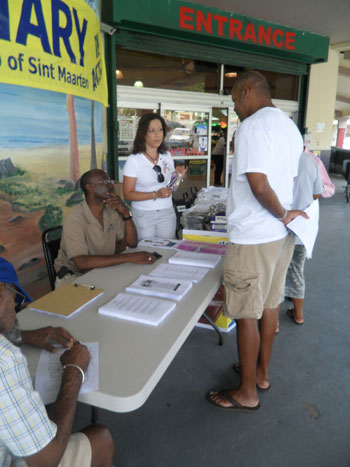 Chairperson of the Rotary Alzheimer's Awareness Campaign expressed great satisfaction with the support received on Saturday last during the fundraising event. The Club was able to raise USD 2700 on Saturday making it possible to meet the commitment made to the St. Maarten Alzheimer's Foundation (SMAF).
Chairperson of the Rotary Alzheimer's Awareness Campaign expressed great satisfaction with the support received on Saturday last during the fundraising event. The Club was able to raise USD 2700 on Saturday making it possible to meet the commitment made to the St. Maarten Alzheimer's Foundation (SMAF).The campaign continues and the focus remains on care. When a person with Alzheimer's becomes aggressive, it is important to try to understand what is causing the person to become angry or upset. Aggressive behaviors may be verbal (shouting, name-calling) or physical (hitting, pushing).
According to the US Alzheimer's Association the main cause of behavioral symptoms is the progressive deterioration of brain cells. However, environmental influences can also cause symptoms or make them worse. Aggression can be caused by many factors including physical discomfort, environmental factors and poor communication. Aggressive behaviors can occur suddenly, with no apparent reason, or can result from a frustrating situation. If the person is aggressive, consider the physical discomfort, perhaps the person is tired because of inadequate rest or sleep. Maybe medications are causing side effects. Side effects are especially likely to occur when individuals are taking multiple medications for several health conditions. It's also possible that the person is unable to let you know he or she is experiencing pain.
There are Environmental factors, consider whether the person is over-stimulated by loud noises, an overactive environment or physical clutter or does the person feel lost.
Poor communication could also play a role. Are you asking too may questions or making too many statements at once? Are your instructions simple and easy to understand? Is the person picking up on your own stress and irritability? Are you being negative or critical?
Consider the following approach. Try to identify the immediate cause. Think about what happened right before the reaction that may have triggered the behavior. Focus on feelings, not the facts. Rather than focusing on specific details, consider the person's emotions. Look for the feelings behind the words. Don't get upset. Don't take the behavior personally. Be positive and reassuring. Speak slowly in a soft tone. Limit distractions. Examine the person's surroundings, and adapt them to avoid similar situations. Try a relaxing activity. Use music, massage or exercise to help soothe the problem. Shift the focus to another activity. The immediate situation or activity may have unintentionally caused the aggressive response. Try something different. Decrease level of danger. Assess the level of danger — for yourself and the person with Alzheimer's. You can often avoid harm by simply stepping back and standing away from the person. If the person is headed out of the house and onto the street, be more assertive. Avoid using restraint or force. Unless the situation is serious, avoid physically holding or restraining the person. He or she may become more frustrated and cause personal harm.
For more information please contact the St. Maarten Alzheimer's Foundation on HOTLINE 9220 or This email address is being protected from spambots. You need JavaScript enabled to view it.. To support the campaign please contact any member of the Rotary Club of St. Maarten or This email address is being protected from spambots. You need JavaScript enabled to view it.. Alzheimer's T-shirts are still available and all who have T-shirts are kindly asked to wear them on September 21st World Alzheimer's Day.













